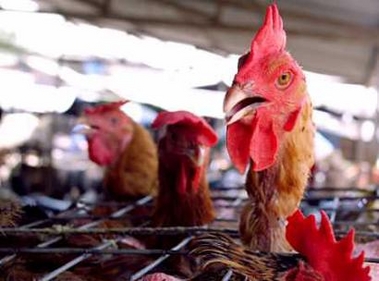|
Chance of bird flu between humans increases - Vietnam
(Agencies)
Updated: 2005-06-25 17:06
Vietnam's agriculture ministry was quoted as saying on Saturday that the
mutation of a bird flu virus was increasing the infection possibility between
humans.
State-run media cited a ministry report as saying laboratory test results
overseas and at home showed the antigen structure of virus is changing.
"The ministry warned in the report that the mutation of the H5N1 virus is
raising the possibility of infections on humans, because the test results of
international and domestic laboratories showed the virus's antigen structure
contained a change," the Saigon Giai Phong (Liberation Saigon) daily said.

Chickens are displayed for sale inside their
cages at a wholesale poultry market in Hanoi, Vietnam June 25, 2005.
Vietnam's agriculture ministry was quoted as saying on Saturday that the
mutation of a bird flu virus was increasing the infection possibility
between humans. State-run media cited a ministry report as saying
laboratory test results overseas and at home showed the antigen structure
of virus is changing. [Reuters] | The mutation of the virus explains why Vietnam did not detect major outbreaks
in poultry in recent months but people still fell sick of avian influenza, it
said.
Officials could not be reached for comment on Saturday.
Bird flu has killed 38 people in Vietnam since it arrived in Asia in late
2003 along with 12 Thais and four Cambodians.
Eighteen of the Vietnamese victims have died since December in the latest
wave of infections by the virus, which seems to thrive best in the cool of
winter.
Officials said just one outbreak in poultry has been detected and isolated in
the southern Mekong Delta this month, but nine people were found having bird flu
in the north where the summer is under way.
On Friday the World Health Organization said a team of international experts
has been working in Vietnam this week to study whether the H5N1 virus may be
evolving into a form which might trigger a human pandemic.
Scientists have been tracking the evolution of the H5N1 virus, which is
infectious in birds but does not spread easily among humans, as they fear it
could mutate into a form capable of unleashing a pandemic.
Humans would have no immunity to the mutated virus and millions could die,
they say.
|